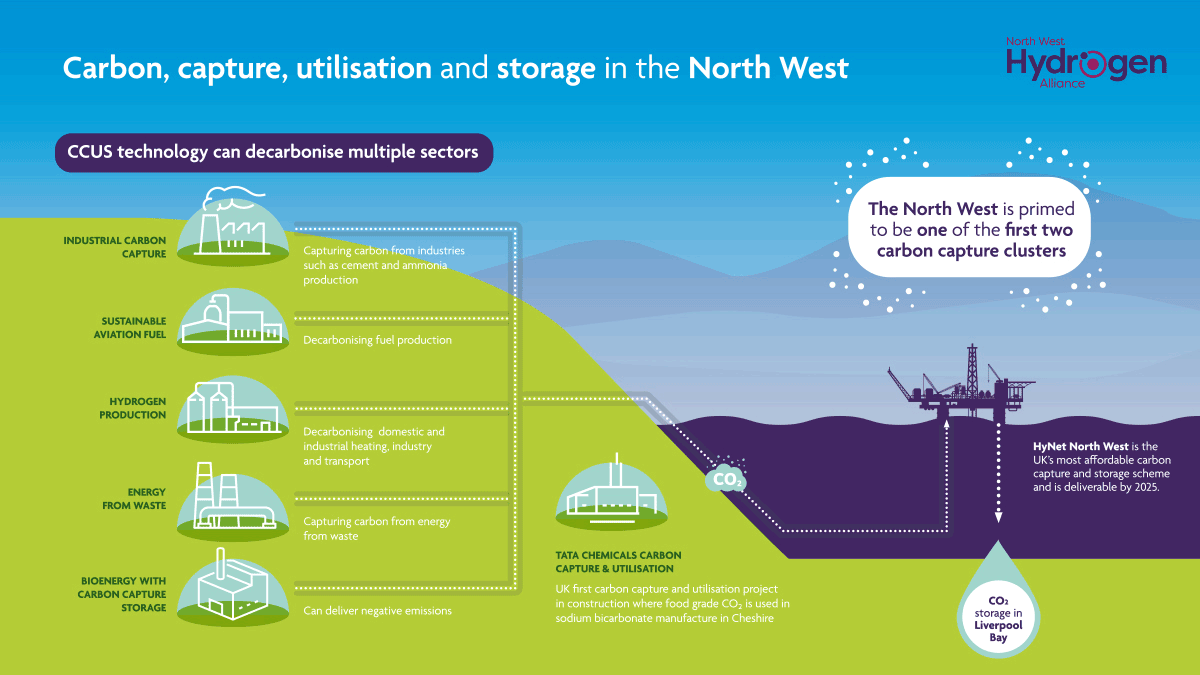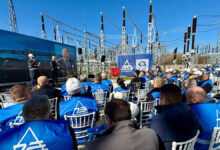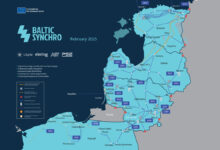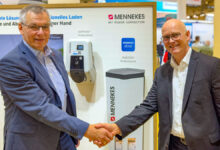NWHA to Be UK’s First Carbon Capture Cluster
The membership of the North West Hydrogen Alliance (NWHA) has thrown its weight behind the North West’s bid to become one of the UK’s first carbon capture clusters.
In a letter to the Secretary of State for Business, Energy and Industrial Strategy, the NWHA has called for Government to support HyNet North West in the upcoming carbon capture usage and storage (CCUS) sequencing competition, arguing that is a vital project for levelling up the UK and essential to the delivery of the Ten Point Plan for a Green Industrial Revolution.
The NWHA represents 30 of the UK’s most influential organisations driving forward the development of a hydrogen economy. Members include leading UK and global companies such as INOVYN (part of the INEOS Group), Peel NRE (part of Peel L&P), ABB, Atkins, Costain, Mott MacDonald, Uniper, and Cadent (the UK’s largest gas distribution network).
CCUS is recognised as an essential technology to help the UK in its fight against climate change with the Committee on Climate Change calling it “a necessity not an option” if we are to meet net zero carbon emissions by 2050. It is also considered vital to the development of a hydrogen economy in the UK.
Following the Prime Minister’s pledge in the Ten Point Plan to invest up to £1 billion to support CCUS in four industrial clusters, or ‘SuperPlaces’, the Department of Business, Energy & Industrial Strategy (BEIS) has launched a competition for Phase 1 of the CCUS cluster sequencing process. This will seek to identify at least two CCUS clusters whose readiness suggests they are most suited to deployment in the mid-2020s to sequence on to ‘Track 1’ of the process.
The North West is home to leading hydrogen and carbon capture project HyNet North West, which can deliver amongst the lowest cost CO2 transport and storage infrastructure in the UK by extensively repurposing existing onshore and offshore assets. The project can deliver over three-quarters of the Government’s 2030 target for hydrogen production and 100% of the target for CO2. Able to benefit from the existing regional technical skill base in engineering, chemicals production, refining and offshore oil and gas, HyNet North West could be operational as early as 2025.
“CCUS is essential to the development of a hydrogen economy in the UK. It will enable blue hydrogen to be developed quickly and at scale, unlocking the hydrogen transportation and storage infrastructure which green hydrogen can then readily connect into,” Professor Joe Howe, Chair of the NWHA and Executive Director, Thornton Research Institute at the University of Chester, said. “Organisations across the North West want to operate more sustainably, and HyNet brings a route by which this can happen, and quickly. In the North West, we are committed to becoming one of the first two carbon capture clusters. We have a unique opportunity to repurpose existing onshore and offshore assets before they need to be decommissioned and deliver one of the lowest cost carbon capture clusters in the UK. The opportunity to create a world leading low carbon industrial cluster, which is vital for the journey to net zero, must be grasped without delay.”
HyNet North West will decarbonise 30 major manufacturing sites across multiple sectors including chemicals, glass, cement, oil refining, FMCG’s, food and drink. It was recently announced that Viridor, one of the UK’s leading recycling, resource and waste management companies, is to join the HyNet consortium with plans to install carbon capture technology at its largest energy from waste site, at Runcorn in the North West. This will support the company’s aim to be the UK’s first net negative emissions waste company.
“HyNet North West is a genuine regional decarbonisation solution. Not focused on one key anchor energy project it has the potential to link together the multitude of low carbon projects across the region and beyond, from hydrogen to energy from waste to industrial processes. Doing this will not only futureproof existing industry, it will safeguard and create thousands of jobs,” Myles Kitcher, Executive Director, Peel NRE, part of Peel L&P mentioned.
In addition to HyNet North West, the region is also set to be the home of a new bioenergy with carbon capture and storage project, InBECCS. The project will see a carbon capture demonstration facility developed at Ince BioPower at Peel NRE’s Protos in Cheshire, which will pioneer the first negative emissions project in the North West and could be ready as early as 2025. The North West also has a UK first carbon capture and utilisation project under construction at Tata Chemicals in Cheshire where food grade CO2 will be used in sodium bicarbonate manufacture.
The North West Hydrogen Alliance brings together some of the UK’s most influential organisations driving forward the work to develop the region as the UK’s primary hydrogen economy. The region’s reputation as the industrial North – including the necessary industries, academia, innovation, skills, and natural assets – means it is in pole position to grasp the opportunity of hydrogen use.







